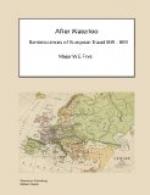The main street in Frankfort called the Zeil is very broad and spacious, and can boast of a number of splendid houses belonging to individuals, particularly the house of Schweitzer[30]; and on the Quai, on the banks of the Mayn, there is a noble range of buildings. The bridge across the Mayn is very fine and on the other side of the river is the suburb of Sachsenhansen, which is famous for being the head-quarters of the priestesses of the Venus vulgivaga who abound in this city. There are in Frankfort an immense number of Jews, who have a quarter of the city allotted to them. The gardens that environ the town are very tastefully laid out, and serve as the favourite promenade of the beau monde of Frankfort. The Cathedral will always be a place of interest as the temple wherein in later times the German Caesars were crowned and inaugurated. At the Hotel de Ville called the Roemer, which is an ugly Gothic building, but interesting from its being in this edifice that the Emperors were chosen, is to be seen the celebrated Golden Bull which is written on parchment in the Latin language with a golden seal attached to it. In the Hall where the Electors used to sit on the election of an Emperor of the Romans, are to be seen the portraits of several of the Emperors, and a very striking one in particular of the Emperor Joseph II, in full length, in his Imperial robes. There is no table d’hote at the Swan for supper, but this meal is served up a la carte, which is very convenient for those who do not require copious meals. At the same table with me at supper sat a very agreeable man with whom I entered into conversation. He was a Hessian and had served in a Hessian battalion in the English service during the American war. He was so kind as to procure me admission to the Casino at the Hotel Rumpf,[31] where there is a literary institution and where they receive newspapers, pamphlets and reviews in the German, French, English and Italian languages. In Frankfort there are several houses of individuals which merit the name of palaces, and there is a great display of opulence and industry in this city. In the environs there is abundance of maisons de plaisance. For commerce it is the most bustling city (inland) in all Germany, besides it being the seat of the present German Diet; and from here, as from a centre, diverge the high roads to all parts of the Empire.
I have been once at the theatre, which is very near the Swan. A German opera, the scene whereof was in India, was given. The scenery and decorations were good, appropriate, and the singing very fair. The theatre itself is dirty and gloomy. The German language appears to me to be better adapted to music than either the French or English. The number of dactylic terminations in the language give to it all the variety that the sdruccioli give to the Italian. As to poetry, no language in the world suits itself better to all the vagaries and phantasies of the Muse, since it possesses so much natural rythm and allows, like the Greek, the combination of compound words and a redundancy of epithets, and it is besides so flexible that it lends itself to all the ancient as well as the modern metres with complete success: indeed it is the only modern language that I know of which does so.




